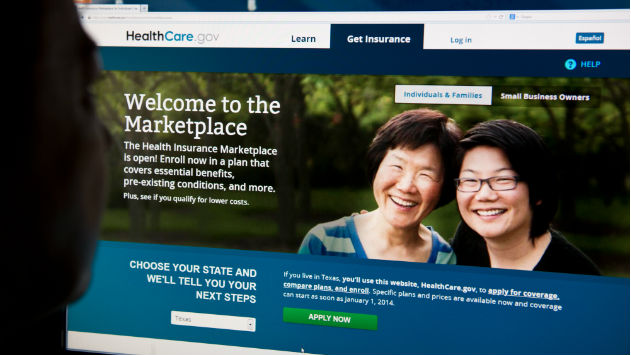Five Big Questions About the Health Care Website
Published at
 KAREN BLEIER/AFP/Getty Images(WASHINGTON) — The end of November brings many things with it: The start of the Christmas season, a flurry of Black Friday and Cyber Monday deals and, of course, the date by which the White House promised that the troubled HealthCare.gov website would be fixed. On Sunday the This Week powerhouse roundtable, which includes former Obama senior adviser David Plouffe, will weigh in on the challenges facing the Affordable Care Act, including the current status of HealthCare.gov. Here are five key questions about the troubled website.
KAREN BLEIER/AFP/Getty Images(WASHINGTON) — The end of November brings many things with it: The start of the Christmas season, a flurry of Black Friday and Cyber Monday deals and, of course, the date by which the White House promised that the troubled HealthCare.gov website would be fixed. On Sunday the This Week powerhouse roundtable, which includes former Obama senior adviser David Plouffe, will weigh in on the challenges facing the Affordable Care Act, including the current status of HealthCare.gov. Here are five key questions about the troubled website.
1. Will the site be able to handle continuously high volumes of traffic?
This is a prominent question about HealthCare.gov: Can the site be built up to handle a lot of vistitors logging on without crashing? Can it maintain high volumes of visitors? As reported by ABC’s Devin Dwyer, White House officials say the site will be able to handle 50,000 users at once, and as many as 800,000 uniques a day.
The site is certainly improved from October. A click-through HealthCare.gov on Nov. 29 found that it was running quickly and smoothly. Of course, it was the Friday of a holiday weekend when presumably lots of folks are traveling, shopping, playing sports with their families and so on, so likely not a high-traffic time.
2. How much traffic will there actually be?
This however is the bigger and more important question: To what degree have the initial problems with the site deterred people from signing up? Will traffic to the site see high traffic again starting early in December– and if so, how high? Or will people be too weary?
3. What’s the definition of fixed?
Does a fixed site mean it always works smoothly and never crashes? No. The White House has already couched the promise of a perfectly functioning site by saying it will work for the “vast majority” of users. And most websites have their problems, so it’s fair to anticipate the occasional glitch coming up. But the metrics being used to quantify a vast improvement are unclear. This question may never have a single, clear answer, particularly given the fact that the early enrollment numbers have been quite low, so it seems as if there really is nowhere to go but up.
4. How secure is the site?
Worries about the website’s security came to light in late October/early November after a memo from Department of Health and Human Services officials that said that the site’s security had not been properly tested surfaced. And at a congressional hearing in November, several technology security experts warned that the site was vulnerable to hacking, and urged the administration to take the site offline until privacy issues were addressed. HHS officials say that steps to secure the site have been taken since the September 27 memo, but assuming the site does experience a high daily volume of visitors, it stands to reason that it will become even more of a target for hackers than- given that it is a place where people provide very private and sensitive information- it presumably already is.
5. Will young, healthy people sign up for the exchange?
The success of the Affordable Care Act depends on younger, healthy people opting to enroll, in addition to those who are older and/or in poor health. It’s this mix that will keep insurance rates from skyrocketing. One of the biggest fears about the troubled roll out is that it may have deterred people who don’t have an immediate need for a health care plan from signing up. Of course, another possibility is that many young people are putting off enrolling until the last enrollment deadline- March 31, 2014- as young people sometimes tend to do, in which case the website’s early troubles could wind up as more of a bump in the road.
Copyright 2013 ABC News Radio


